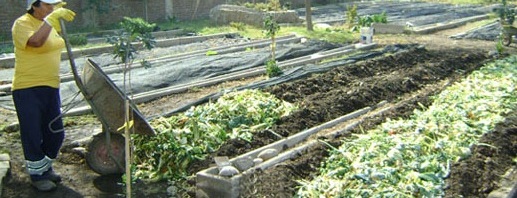Grainne McIntyre, consultant, lives locally and reflects on what might help Dunbar become a Zero Waste Town. This is the third of 5 case studies from across the globe

The Chilean community of La Pintana – one of the poorest in the country – has found that recycling their largest waste segment – vegetable waste and organic garden waste – is saving them money by making other waste streams easier to recycle and creating valuable composts. Although participation rates may not be that high, La Pintana’s waste recovery program seems to be showing signs of working.
What are the ingredients for success? It seems that a holistic approach, which looked at waste streams, rather than sources was in part helpful. The local authority took the view that it matters less who is creating waste, and there are efficiencies in handling segregated waste streams. Secondly, waste miles were too high and the costs of disposal needed to be reduced. A more localised solution turned out to be more cost effective. Thirdly, a local education campaign was necessary, but seems to need regular reinforcement and additional publicity interventions. Fourth, there are a variety of incentives to make it worthwhile for people to participate.
In a practical sense, the local authority provides householders with 35L bins to collect vegetable wastes. Only fruit and vegetable waste is composted, and though some meat and dairy enters the waste stream, meat consumption in this community is very low.
The educational interventions use door to door visits, using environmental graduates talking to householders about the benefits of segregating wastes. There are follow up workshops.
People get direct and indirect incentives to separate their waste. Free compost is available and neighborhoods are being improved, with new public parks, new tree planting, and maintenance of sports areas. Dry recyclables are recovered also via a “green points” bring bank scheme built by the local authority, but operated by non-governmental bodies, who locate their containers to collect glass, plastics, and even tetra Pak containers. The nonprofits retain the income from the sale of the materials to operate the scheme.
Collections are made by private and municipal operators, for whom the impact of the change was cost neutral. Rescheduling routes and no additional capital costs meant the costs of collection were kept down, helped by collecting from business and householders at the same time. Reducing journey times and waste miles also helped. Every day, 1,000L of kitchen oil are recovered and turned into biodiesel fuel for municipal collection trucks, and this also runs the woodchip machinery.
Participation rates are still low, which seems down to poor householder experiences, such as missed collections and a lack of space to keep multiple bins in multi-story buildings, which also constrains any further source segregation for kerbside collections. In fact, the informal recycling sector is working alongside the schemes described above and they are picking up paper and metals, which increases the number of opportunities for recycling.
Organic wastes are transported to a site that handles 18 tons each day. There are an additional 136 worm beds spread over 2000m2, which treat the same amount again. There’s also a mulching plant (for courser garden wastes), a nursery, and an urban silviculture program as well as a woodwork shop. Furniture and crafts made from scrap wood are sold and people can also learn woodworking skills.
Despite being a disadvantaged community, La Pintana shows that tight budgets are not necessarily a barrier to innovative solutions. It clearly takes more complex interventions on a number of different fronts – there is no universal answer or a single bin solution. Perhaps more time and deeper understanding of local householder problems and issues is necessary to encourage fuller community participation.
What are the lessons for a small town like Dunbar, which is not so economically disadvantaged but facing budgetary strictures all the same? Some clear and visible community payback could be helpful in encouraging participation – indeed some serious improvements in public green space or tree planting would not go amiss. The green points scheme deserves greater investigation, especially as current high tech deposit return schemes are cripplingly expensive and prone to operational problems. Wormeries are increasingly commonplace in domestic gardens, even in Dunbar, so it would be interesting to see what the potential is for larger scale wormeries, (in partnership with the local waste operator?), though this looks to be constrained by being labour intensive.
